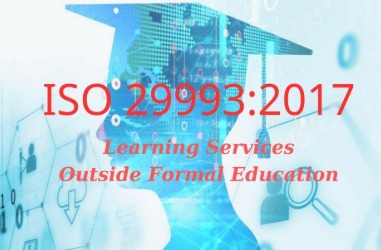ISO 29993:2017 – Ensuring Quality in Learning Services Outside Formal Education
In today’s dynamic world, education is no longer limited to schools and universities. A wide range of organizations now offer learning and training services outside formal education — from corporate training programs to online skill development courses. To ensure consistent quality and effectiveness in such learning services, the International Organization for Standardization (ISO) developed ISO 29993:2017 – Learning Services Outside Formal Education – Service Requirements.
What is ISO 29993:2017?
ISO 29993:2017 is an international standard that sets the requirements for learning services provided outside formal educational systems. It focuses on improving the quality, transparency, and effectiveness of learning activities delivered by organizations such as training institutes, coaching centers, corporate trainers, and e-learning providers.
The standard applies to all types of learning services — whether delivered face-to-face, online, or through blended learning formats. It covers the entire learning process, from assessing learners’ needs to delivering the course and evaluating learning outcomes.
Objectives of ISO 29993
The primary goal of ISO 29993 is to establish a structured approach to delivering high-quality learning services. The main objectives include:
-
Ensuring that learning programs are learner-centered and tailored to participants’ needs.
-
Enhancing transparency and consistency in training design and delivery.
-
Promoting continuous improvement in learning outcomes and satisfaction.
-
Providing learners and clients with clear information about courses, objectives, and assessment methods.
-
Supporting organizations in achieving international recognition for their training quality.
Key Requirements of ISO 29993:2017
The standard defines several requirements that a learning service provider must meet:
-
Needs Analysis:
The provider must assess learners’ needs, objectives, and expectations before designing a course.
-
Design and Delivery:
Learning programs should be structured, relevant, and goal-oriented. Trainers must be competent and qualified in their subject areas.
-
Assessment and Evaluation:
The organization should have systems in place to evaluate learners’ progress and the overall effectiveness of the learning process.
-
Communication and Information:
All course-related information — such as learning outcomes, methods, schedules, and fees — must be communicated clearly to learners.
-
Continuous Improvement:
Feedback from learners and stakeholders must be used to improve future training programs and maintain quality standards.
Benefits of ISO 29993 Certification
Implementing ISO 29993 offers numerous advantages for learning service providers:
-
Improved Learning Quality: Ensures structured, consistent, and effective learning outcomes.
-
Enhanced Credibility: Demonstrates the organization’s commitment to international quality standards.
-
Increased Learner Satisfaction: Focuses on learner needs and measurable results.
-
Global Recognition: Builds trust and acceptance among clients, learners, and institutions worldwide.
-
Continuous Improvement: Encourages ongoing review and enhancement of training methods.
Conclusion
ISO 29993:2017 plays a vital role in promoting excellence and reliability in non-formal education and training. By implementing its guidelines, organizations can deliver more effective learning experiences that align with international best practices.
In a world where lifelong learning is essential, ISO 29993 ensures that learners receive high-quality education — empowering individuals and strengthening organizations through consistent, transparent, and impactful learning services.






